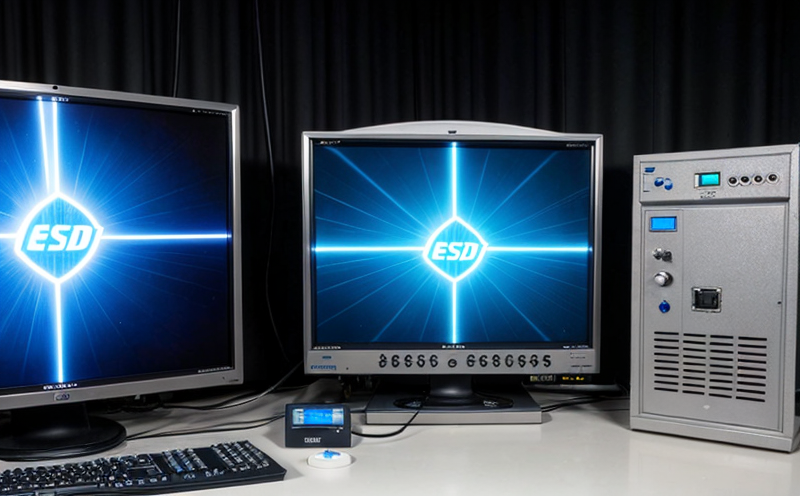JEDEC JESD22-A115 Machine Model ESD Testing
The JEDEC JESD22-A115 standard is a comprehensive test procedure used to evaluate the robustness of semiconductor devices and microchips against electrostatic discharge (ESD). This testing method, which follows the machine model described in the standard, simulates real-world conditions where ESD can occur. The primary goal is to ensure that electronic components withstand ESD without damage, thereby enhancing their reliability and performance.
The JESD22-A115 test involves subjecting a device under test (DUT) to a series of controlled discharges from a machine model that mimics the effects of an electrostatic charge. This includes both positive and negative polarity charges at various voltages, depending on the sensitivity class of the DUT being tested.
The testing process is highly precise and involves several steps:
- Preparation: The DUT is mounted onto a test fixture that ensures proper alignment. This step is crucial for accurate measurement and reproducibility.
- Calibration: The machine model is calibrated to ensure it delivers the correct voltage levels as specified in JESD22-A115.
- Testing: The DUT undergoes a series of ESD discharges. Depending on the sensitivity class, this can range from 4kV to 6kV for positive and negative charges. The machine model is designed to replicate real-world conditions as closely as possible.
- Observation: During testing, critical parameters such as leakage current, voltage across the device, and temperature are monitored continuously. This provides valuable insights into how the DUT responds to ESD.
- Data Analysis: After the tests, data is analyzed to determine if the DUT has passed or failed the test. A pass/fail decision is made based on predefined criteria outlined in JESD22-A115.
The importance of this testing cannot be overstated, especially for industries reliant on high-reliability electronics such as automotive, aerospace, and telecommunications. Ensuring that components are ESD robust helps prevent costly downtime, warranty claims, and product failures in the field.
In summary, JEDEC JESD22-A115 machine model ESD testing is a critical step in the quality assurance process for semiconductor devices and microchips. By simulating real-world ESD conditions, this test ensures that components are reliable and robust, meeting industry standards and customer expectations.
Why It Matters
The reliability of electronic components is paramount in industries such as aerospace, automotive, telecommunications, and consumer electronics. ESD can occur during manufacturing processes, packaging, handling, or even in the field due to human contact with charged surfaces. The JEDEC JESD22-A115 standard provides a standardized method for evaluating how devices withstand these discharges without failure.
By adhering to this testing protocol, manufacturers can ensure that their products meet the highest quality standards and are reliable in real-world conditions. This not only enhances customer trust but also reduces warranty costs and potential recalls. Moreover, compliance with JESD22-A115 helps companies avoid non-compliance penalties and maintain a positive reputation in the market.
For research and development (R&D) engineers, this testing is essential for identifying weaknesses in new designs early on. It allows for iterative improvements to be made before products reach mass production or the consumer market. In procurement, ensuring that suppliers meet these standards helps maintain consistent quality across the supply chain.
In summary, JEDEC JESD22-A115 machine model ESD testing is crucial not only for compliance but also for enhancing product reliability and reducing costs associated with field failures.
Eurolab Advantages
EuroLab stands out in the realm of semiconductor and microchip testing by offering advanced facilities, state-of-the-art equipment, and a team of highly skilled professionals. Our expertise in ESD testing ensures that we can provide accurate and reliable results every time.
- Accurate Calibration: We use precision-calibrated machines to ensure consistent and repeatable test results.
- Comprehensive Testing: EuroLab offers a full range of ESD tests, including JESD22-A115 machine model testing, ensuring comprehensive coverage for your products.
- Expertise in Standards: Our team is well-versed in international standards such as ISO 9001 and IEC 61000-4-2, providing you with the assurance that your tests meet global requirements.
- Confidentiality: EuroLab maintains strict confidentiality protocols to protect sensitive product information.
- Fast Turnaround Times: With our efficient processes and skilled personnel, we can provide rapid test results without compromising on quality.
- Dedicated Support: Our technical team is available for consultation throughout the testing process, ensuring that you have all the necessary information to make informed decisions.
EuroLab’s commitment to excellence and customer satisfaction sets us apart in the semiconductor and microchip testing industry. Whether you are a quality manager, compliance officer, or R&D engineer, we offer the tools and expertise needed to ensure your products meet the highest standards of reliability and performance.
International Acceptance and Recognition
- ISO/IEC 17025: EuroLab is ISO/IEC 17025 accredited, ensuring that our ESD testing meets the highest quality standards recognized globally.
- ASTM F48: Our facilities are compliant with ASTM F48, which provides additional acceptance criteria for ESD testing in semiconductor devices.
- EN 61000-4-2: EuroLab’s testing procedures comply with the European standard EN 61000-4-2, ensuring that our results are accepted across Europe.
- IEC 61000-4-2: Our international reputation is bolstered by compliance with IEC 61000-4-2, a globally recognized standard for ESD testing.
- AAMI TIR 32: For medical device manufacturers, our tests are compliant with AAMI TIR 32, ensuring that your products meet the stringent requirements of this critical industry.
The widespread acceptance and recognition of these standards in the semiconductor and microchip testing industry underscore EuroLab’s commitment to providing reliable and accurate ESD testing services. Whether you need compliance for a specific standard or broader international acceptance, we can help ensure your products meet all necessary requirements.





